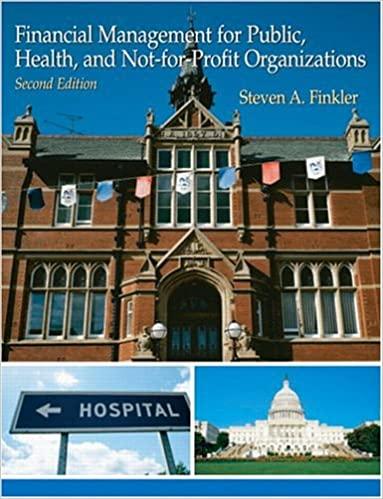Question
Question 5. (15 points total) (Profitability and capital structure analysis) In the year that just ended, Callaway Lighting had sales of $5,470,000 and incurred cost
Question 5. (15 points total) (Profitability and capital structure analysis) In the year that just ended, Callaway Lighting had sales of $5,470,000 and incurred cost of goods sold equal to $4,460,000. The firm's operating expenses were $128,000 and its increase in retained earnings was $42,000 for the year. There are currently 99,000 common stock shares outstanding and the firm pays a $4.770 dividend per share. The firm has $1,180,000 in interest-bearing debt on which it pays 7.7 percent interest. A) Assuming the firm's earnings are taxed at 35%, construct the firm's income statement.
| Income Statement | ||
| Revenues | $ |
|
| Cost of Goods Sold |
| |
| Gross Profit | $ |
|
| Operating Expenses |
| |
| Net Operating Income | $ |
|
| Interest Expense | ||
| Earnings before Taxes | $ | |
| Income Taxes | ||
| Net Income | $ |
B Calculate the firm's operating profit margin and net profit margin. (Round to one decimal place.)
|
The operating profit margin is | % | |
| The net income margin is | % |
C. Compute the times interest earned ratio.
| The times interest earned ratio is | % |
What does this tell you about Callaway's ability to pay its interest expense? (Fill in the blank with the times interest earned ratio from above and select the best choice.)
Callaway's operating income can fall as much as ______ times the interest expense and the company would still be able to service its debt. Callaway's interest expense is _______ times higher than its competitors. Callaway's gross profit can fall as much as ______ times and still be able to service its debt. Callaway's operating income can fall as much as ______ times and still be able to repay its debt. The firm's return on equity is the same as the net profit margin, 9.4%. The firm's return on equity is the sum of the operating profit margin and the net profit margin, 25.5%. There is not enough information to answer this question. The firm's return on equity is the same as the operating profit margin, 16.1%.Question 5. (15 pointstotal) (Profitabilityand capital structure analysis) Inthe year that just ended, Callaway Lighting had sales of $5,470,000 andincurred cost of goods sold equal to$4,460,000. The firm's operatingexpenses were $128,000 and itsincrease in retained earnings was $42,000 for the year. There are currently99,000 common stock shares outstandingand the firm pays a $4.770 dividend pershare. The firm has $1,180,000 ininterest-bearing debt on which it pays 7.7percent interest. A) Assuming the firm's earnings are taxed at 35%,construct the firm's income statement.
| Income Statement | ||
| Revenues | $ |
|
| Cost of Goods Sold |
| |
| Gross Profit | $ |
|
| Operating Expenses |
| |
| Net Operating Income | $ |
|
| Interest Expense | ||
| Earnings before Taxes | $ | |
| Income Taxes | ||
| Net Income | $ |
B Calculate the firm's operating profitmargin and net profit margin. (Round to one decimal place.)
|
The operating profit margin is | % | |
| The net income margin is | % |
C. Compute the times interest earned ratio.
| The times interest earned ratio is | % |
What does this tell you about Callaway'sability to pay its interest expense? (Fill in the blank with the times interestearned ratio from above and select the best choice.)
1)Callaway'soperating income can fall as much as ______ times the interest expense and thecompany would still be able to service its debt.
2)Callaway'sinterest expense is _______ times higher than its competitors.
3)Callaway'sgross profit can fall as much as ______ times and still be able to service itsdebt.
4)Callaway'soperating income can fall as much as ______ times and still be able to repayits debt.
What is the firm's return on equity? (Selectthe best choice.)
1)Thefirm's return on equity is the same as the net profit margin, 9.4%.
2)Thefirm's return on equity is the sum of the operating profit margin and the netprofit margin, 25.5%.
3)Thereis not enough information to answer this question.
4)Thefirm's return on equity is the same as the operating profit margin, 16.1%.
Step by Step Solution
There are 3 Steps involved in it
Step: 1

Get Instant Access to Expert-Tailored Solutions
See step-by-step solutions with expert insights and AI powered tools for academic success
Step: 2

Step: 3

Ace Your Homework with AI
Get the answers you need in no time with our AI-driven, step-by-step assistance
Get Started


